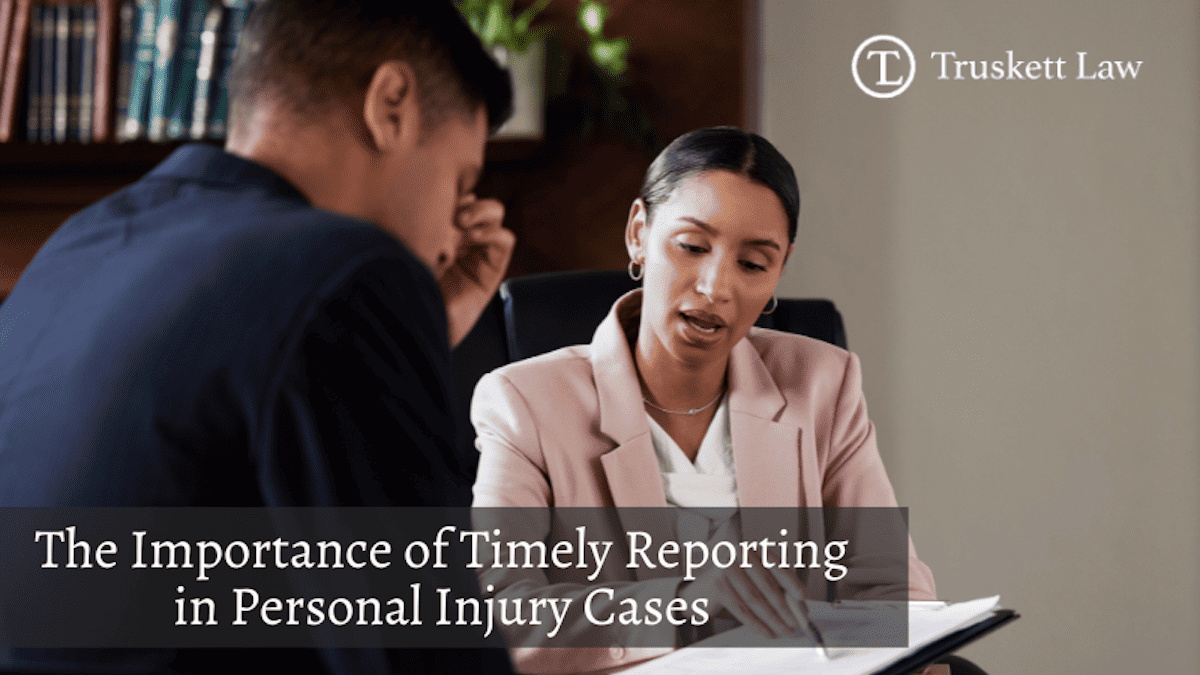
20 Feb The Importance of Timely Reporting in Personal Injury Cases
Why Timely Reporting in Personal Injury Cases Is Important
In the realm of personal injury cases, timely reporting plays a pivotal role in ensuring a fair and just outcome for the affected parties. Over time, critical evidence can be lost or compromised, eyewitness accounts can become less reliable, and legal statutes of limitations can render a claim invalid.
It is therefore essential for individuals involved in accidents or incidents resulting in personal injury to promptly document their experiences and seek professional advice to understand their rights and legal options.
In this article, we will explore the importance of timely reporting in personal injury cases and strategies for navigating the complex landscape of personal injury litigation. By arming ourselves with this knowledge, we can help ensure that those who have suffered due to the negligence of others receive the support and compensation they deserve.
The Foundation of Strong Personal Injury Cases
Timely reporting in personal injury cases serves as the cornerstone of building a robust legal case in personal injury litigation. Without prompt action, valuable evidence may dissipate, witnesses’ memories may fade, and crucial details could be lost with time.
By promptly reporting an injury, individuals can preserve vital evidence, such as photographs of the accident scene, medical records, and eyewitness testimonies, which can significantly strengthen their legal claim.

Preserving Crucial Evidence
The preservation of evidence is paramount in personal injury cases. Whether it’s documenting the scene of the accident or securing medical records detailing the extent of injuries, every piece of evidence plays a pivotal role in substantiating one’s claim.
Prompt reporting ensures that evidence is preserved in its most pristine state, enabling legal representatives to construct a compelling narrative on behalf of the injured party.
Documenting the Accident Scene
After an accident occurs, the scene may change due to factors like weather conditions, cleanup efforts, or repairs. By promptly documenting the accident scene through photographs or videos, individuals can capture critical details that may later serve as crucial evidence in establishing liability and proving the extent of damages.
Meeting Legal Deadlines For Timely Reporting In Personal Injury Cases
In personal injury cases, there are strict deadlines, known as statutes of limitations, within which a lawsuit must be filed. Failure to adhere to these deadlines can result in the forfeiture of one’s right to seek compensation.
Timely reporting ensures that victims are aware of these deadlines and allows ample time for legal proceedings to commence without undue delay.
Strengthening Credibility and Reliability
Promptly reporting a personal injury not only preserves evidence but also enhances the credibility and reliability of the victim’s account. Insurance companies and legal adversaries often scrutinize the timing of injury reports, viewing delays with suspicion and skepticism.
By promptly reporting an injury, individuals demonstrate transparency and a commitment to seeking redress for their losses, thereby bolstering the legitimacy of their claims.

Demonstrating Diligence and Responsibility
Timely reporting in personal injury cases signifies a proactive approach toward addressing the consequences of said injury. It showcases the injured party’s diligence and sense of responsibility in promptly notifying relevant parties about the incident, thereby facilitating a smoother claims process and fostering goodwill in legal proceedings.
Minimize Legal Obstacles Through Timely Reporting In Personal Injury Cases
Delays in reporting a personal injury can present significant obstacles and challenges in the pursuit of justice. From disputed liability to diminished evidence, procrastination can jeopardize the outcome of a case and impede the attainment of rightful compensation.
Timely reporting, on the other hand, minimizes these obstacles and ensures that victims can navigate through the legal process with greater ease and efficacy.
Avoiding Disputes Regarding Causation of Personal Injury Cases
In personal injury litigation, establishing causation is crucial in attributing liability to the responsible party. Delayed reporting can complicate matters by introducing doubts regarding the causal relationship between the accident and the resulting injuries.
Timely reporting in personal injury cases helps mitigate such disputes by providing a clear timeline of events and establishing a direct link between the accident and the injuries sustained.
Preventing Spoliation of Evidence
Spoliation of evidence refers to the intentional destruction or alteration of evidence that is detrimental to one party’s case. Delayed reporting increases the risk of evidence tampering or destruction, particularly if the opposing party anticipates legal action. By promptly reporting an injury, individuals minimize the risk of spoliation, ensuring that all pertinent evidence remains intact and admissible in court.

What Qualifies As A Personal Injury?
Now that we have a thorough understanding of timely reporting in a personal injury case and why it is important, let’s make sure we know what counts as a personal injury.
A personal injury refers to any harm or damage sustained by an individual’s body, mind, or emotions as a result of another person’s negligence, intentional actions, or failure to act. This broad category can include various types of incidents, such as:
- Slip and fall accidents: Injuries resulting from slipping, tripping, or falling due to unsafe conditions on another person’s property, such as wet floors, uneven pavement, or poor lighting.
- Motor vehicle accidents: Injuries caused by car accidents, truck accidents, motorcycle accidents, bicycle accidents, or pedestrian accidents.
- Medical malpractice: Injuries or harm caused by a healthcare professional’s negligence, such as misdiagnosis, surgical errors, or medication errors.
- Product liability: Injuries caused by defective products, including design defects, manufacturing defects, or failure to warn about potential hazards.
- Workplace accidents: Injuries that occur in the workplace, such as construction site accidents, industrial accidents, or repetitive strain injuries.
- Assault and battery: Injuries inflicted by another person through intentional physical harm or threats of harm.
In addition to these examples, personal injury can also cover a wide range of other incidents, such as dog bites, nursing home negligence, and premises liability cases. Each case is unique, and the specific circumstances surrounding the injury will determine whether the injured party has grounds for a personal injury claim.
If you are unsure whether or not you have a legitimate personal injury case, it is advised that you still document everything and get in contact with a personal injury lawyer promptly.
Personal Injury Cases: Report Yours Today
In conclusion, timely reporting in personal injury cases is not merely a procedural formality but a crucial step in safeguarding one’s rights and interests in personal injury cases. From preserving critical evidence to enhancing credibility and minimizing legal hurdles, the benefits of prompt action are manifold.
By recognizing the importance of timely reporting and acting swiftly in the aftermath of an injury, individuals can position themselves for a favorable outcome and secure the justice and compensation they rightfully deserve.
Related Questions
Can delayed reporting affect my ability to file a lawsuit?
Yes, delayed reporting can adversely impact your ability to file a lawsuit, as there are statutes of limitations that dictate the timeframe within which legal action must be initiated. Failure to report promptly may result in the loss of your right to seek compensation.
What should I do if I’m unsure about reporting a personal injury?
If you’re unsure about whether to report a personal injury, it’s best to consult with a knowledgeable attorney who can assess your situation and provide guidance on the appropriate course of action.
Will insurance companies investigate the timing of my injury report?
Yes, insurance companies often investigate the timing of injury reports as part of their claims evaluation process. Prompt reporting can help avoid suspicion and expedite the claims process.
Can I report a personal injury on behalf of someone else?
Yes, if you witness an accident or are acting as a legal guardian or representative for an injured party, you can report the personal injury on their behalf to ensure that their rights are protected.
What if I discover additional injuries after initially reporting the incident?
If you discover additional injuries after initially reporting the incident, it’s essential to promptly notify relevant parties, such as your attorney or insurance provider, to ensure that all injuries are documented and included in your claim.


Sorry, the comment form is closed at this time.